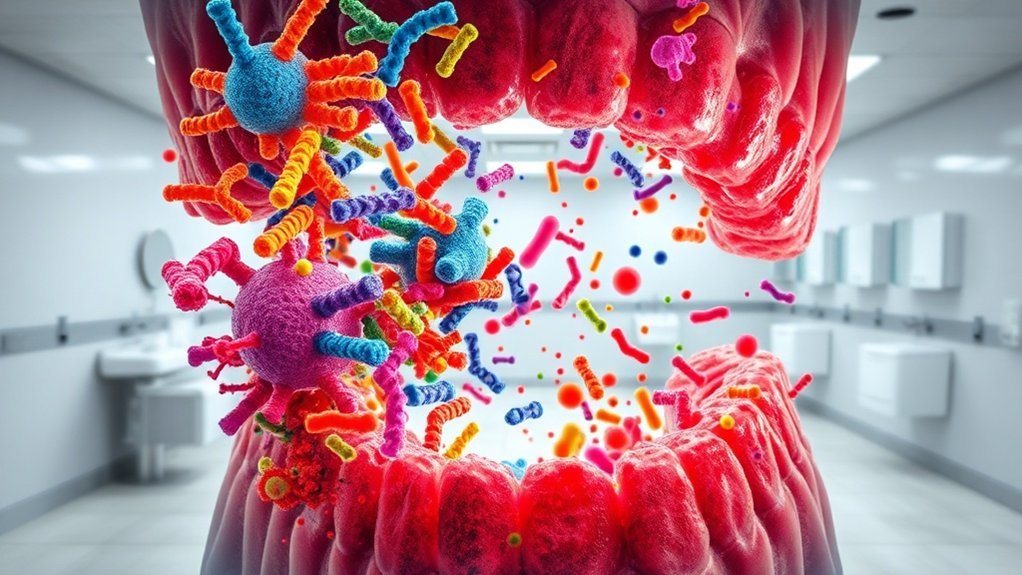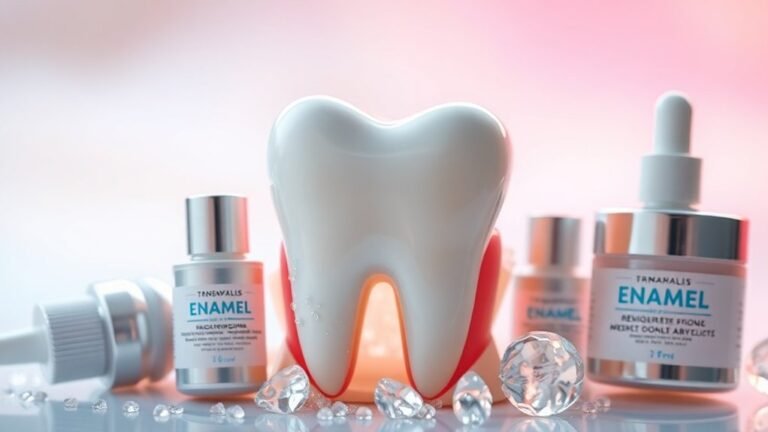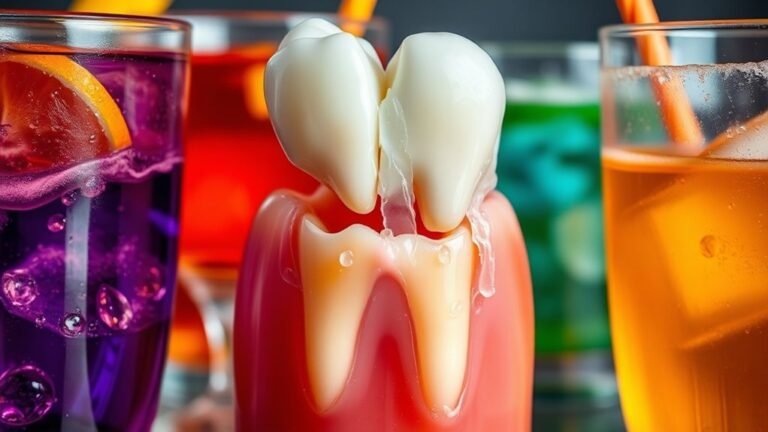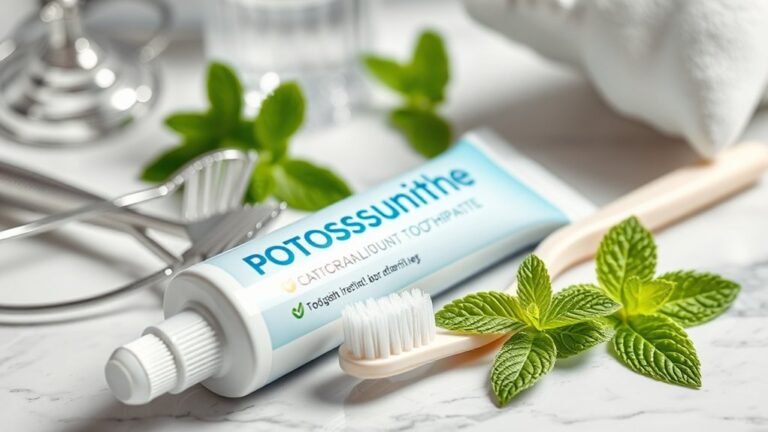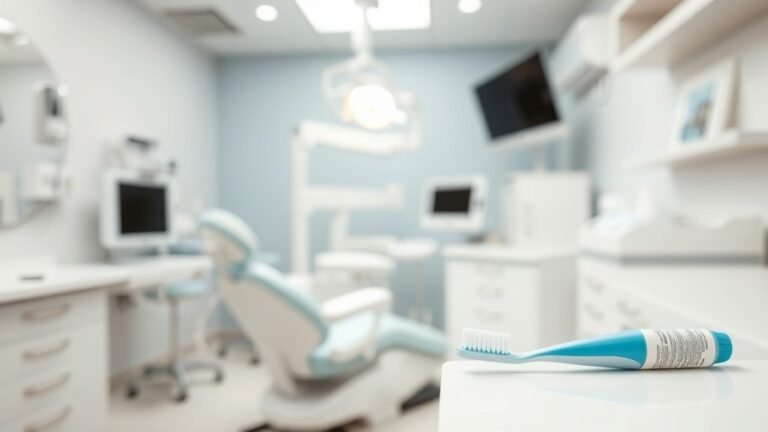Antibiotics Cannot Fix Underlying Issues of Oral Microbial Imbalance
Antibiotics can’t resolve oral microbial imbalances because they eliminate both harmful and beneficial bacteria, masking underlying issues rather than fixing them. This disruption can lead to long-term complications, including antibiotic resistance. Lifestyle factors such as poor diet, stress, and inadequate oral hygiene play a significant role in microbial dysbiosis. Instead of relying solely on antibiotics, you should focus on a holistic approach that includes a balanced diet and effective oral hygiene. More insights await you on this important topic.
Key Takeaways
- Antibiotics eliminate harmful bacteria but disrupt beneficial microorganisms, failing to address the root causes of microbial imbalance.
- Overuse of antibiotics can lead to antibiotic resistance, complicating future treatment options and prolonging recovery.
- Antibiotics do not tackle lifestyle factors, such as diet and stress, that contribute to oral microbial imbalances.
- Short-term antibiotic use may alleviate symptoms but does not ensure lasting oral health or restore microbial balance.
- A holistic approach, including diet and hygiene, is essential for maintaining oral microbial health beyond antibiotic treatment.
Understanding Oral Microbial Imbalance
While you may not think about it often, the balance of microorganisms in your mouth plays an essential role in your overall health. An oral microbial imbalance can lead to various issues, including gum disease and cavities. Disruptions in this balance often stem from factors like poor diet, stress, and the overuse of antibiotics. Antibiotics limitations become apparent when treating infections, as they can eliminate harmful bacteria but also disrupt beneficial microorganisms. This disruption can exacerbate the very infections they aim to treat. Understanding the dynamics of oral microbial balance is crucial for effective infection treatment and prevention. Maintaining a healthy oral environment helps support beneficial bacteria, reducing the risk of complications stemming from microbial imbalance.
The Limitations of Antibiotics in Oral Health
While antibiotics can effectively treat infections, their overuse in oral health raises concerns about antibiotic resistance. You may not realize that this resistance can lead to treatment failures and complicate future care. Additionally, antibiotics disrupt the delicate balance of oral microbiota, potentially exacerbating existing oral health issues.
Antibiotic Resistance Concerns
As antibiotic resistance becomes an escalating concern in healthcare, its implications for oral health cannot be overlooked. You need to understand that prolonged antibiotic use can lead to biofilm resistance, where harmful bacteria form protective layers that antibiotics struggle to penetrate. This resistance not only diminishes the effectiveness of commonly prescribed antibiotics but also increases the risk of persistent infections in your oral cavity. Research shows that antibiotic-resistant bacteria can flourish in dental biofilms, complicating treatment options and prolonging recovery times. Consequently, relying solely on antibiotics to manage oral conditions can be counterproductive. To effectively address oral microbial imbalances, consider integrating alternative approaches that promote a healthier microbial environment rather than solely depending on antibiotics.
Disruption of Microbial Balance
Prolonged antibiotic use disrupts the delicate balance of oral microbiota, leading to an overgrowth of opportunistic pathogens. When you take antibiotics, they don’t just target harmful bacteria; they also eliminate beneficial strains that help maintain oral health. This imbalance can result in conditions like oral thrush or gingivitis, as the suppressed beneficial bacteria can’t compete with the harmful ones. Studies have shown that such disruptions can alter salivary microbiomes, impacting immune responses and increasing inflammation. Consequently, while antibiotics may temporarily reduce bacterial infections, they often fail to address the underlying microbial imbalance. Instead of solely relying on antibiotics, consider adopting a holistic approach, including probiotics, to restore and maintain your oral microbiome’s balance.
Factors Contributing to Oral Microbial Imbalance
Understanding the factors contributing to oral microbial imbalance is essential for maintaining oral health. Several key elements can disrupt your oral microbiome. Poor oral hygiene allows harmful bacteria to thrive while beneficial species diminish. Frequent sugar consumption fuels pathogenic bacteria, leading to an acidic environment that promotes decay. Additionally, smoking alters saliva composition and reduces its antimicrobial properties. Stress can weaken your immune response, making you more susceptible to infections. Certain medications, particularly antibiotics, can indiscriminately kill bacteria, further tipping the balance. Finally, systemic health conditions, like diabetes, can exacerbate microbial dysbiosis. By recognizing these contributing factors, you can take proactive steps to preserve your oral microbiome and overall health.
The Importance of a Healthy Diet for Oral Health
A healthy diet plays an essential role in maintaining oral health by providing necessary nutrients that support balanced microbial communities. Consuming sugar-rich foods can disrupt this balance, leading to the overgrowth of harmful bacteria. Additionally, staying well-hydrated helps to flush out toxins and maintain ideal conditions for beneficial microbes.
Nutrient-Rich Foods Matter
While you might think that brushing and flossing are the only keys to maintaining oral health, the role of a nutrient-rich diet cannot be overstated. Consuming a variety of vitamins and minerals plays an essential role in supporting your oral microbiome and overall health. A balanced diet can enhance your immune system, making it easier for your body to combat harmful bacteria.
- Calcium and Vitamin D: Strengthen your teeth and bones.
- Vitamin C: Promotes healthy gums and reduces inflammation.
- Fiber-Rich Foods: Stimulate saliva production, which helps neutralize acids.
Incorporating these nutrient-rich foods into your diet can foster a healthier oral environment, ultimately working in tandem with your oral hygiene practices to prevent dental issues.
Sugar’s Impact on Microbes
When you consume sugar, you’re not just treating your taste buds; you’re also creating an environment that can greatly alter your oral microbiome. High sugar intake fuels harmful bacteria, leading to an imbalance that promotes dental issues like cavities and gum disease. Research indicates that sugar acts as a primary energy source for cariogenic bacteria, such as Streptococcus mutans, which produce acids that erode tooth enamel. This imbalance can hinder beneficial microbes, disrupting the overall microbial community. A diet high in sugar not only damages your teeth but also exacerbates inflammation and oral health problems. Thus, minimizing sugar consumption is essential for maintaining a balanced oral microbiome, supporting both dental health and systemic well-being.
Hydration and Oral Balance
Excessive sugar consumption can lead to significant microbial imbalances in your mouth, but hydration plays a key role in maintaining oral health. Drinking enough water helps wash away food particles, reduces acidity, and supports saliva production, which is essential for a balanced oral microbiome. Here’s why staying hydrated matters:
- Supports Salivary Function: Adequate hydration fosters salivary flow, important for neutralizing harmful acids.
- Flushes Out Bacteria: Drinking water helps eliminate excess sugar and bacteria, preventing plaque buildup.
- Promotes Nutrient Absorption: Proper hydration aids in the absorption of critical nutrients that strengthen your teeth and gums.
Effective Oral Hygiene Practices for Balance
To maintain a balanced oral microbiome, effective oral hygiene practices are vital. Brush your teeth twice daily using fluoride toothpaste, as this helps remove plaque and reduces harmful bacteria. Don’t forget to floss daily; it reaches areas your brush can’t, preventing food particles from contributing to microbial imbalance. Rinsing with an antimicrobial mouthwash can further inhibit the growth of pathogenic bacteria. Additionally, consider incorporating a tongue scraper to eliminate bacteria from the tongue’s surface. Regular dental check-ups are important, as professionals can identify issues early and provide tailored advice. Finally, limit sugar intake; high sugar levels foster an environment conducive to harmful bacteria. By adopting these practices, you can support a healthier oral microbiome and overall dental health.
Holistic Approaches to Restoring Oral Microbial Health
While conventional treatments often focus solely on antibiotics to address oral microbial imbalances, a holistic approach can offer a more sustainable path to restoring oral health. By integrating lifestyle changes and natural remedies, you can effectively support your oral microbiome.
- Dietary Adjustments: Incorporate prebiotic and probiotic foods to nourish beneficial bacteria.
- Stress Management: Practice mindfulness techniques, as stress can disrupt microbial balance.
- Regular Oral Care: Use natural mouthwashes and fluoride-free toothpaste to maintain a healthy environment for oral flora.
These strategies emphasize prevention and long-term health, rather than relying on short-term fixes. Evidence suggests that fostering a balanced oral microbiome can enhance overall well-being and reduce the risk of future imbalances.
Frequently Asked Questions
Can Stress Affect Oral Microbial Balance?
Yes, stress can greatly affect your oral microbial balance. Chronic stress may lead to hormonal changes that promote harmful bacteria growth, disrupting the delicate ecosystem in your mouth and potentially resulting in dental issues.
How Does Hydration Influence Oral Health?
Hydration directly influences oral health by maintaining saliva production, which helps wash away food particles and bacteria. When you’re well-hydrated, your mouth stays moist, reducing the risk of cavities and gum disease considerably.
Are Probiotics Beneficial for Oral Microbial Balance?
Yes, probiotics can benefit oral microbial balance; studies show a 20% reduction in cavities with regular probiotic use. They help restore beneficial bacteria, promoting healthier gums and teeth while reducing harmful pathogens in your mouth.
What Role Do Smoking and Alcohol Play in Oral Health?
Smoking and alcohol considerably harm oral health by disrupting microbial balance, increasing inflammation, and promoting gum disease. They can also lead to dry mouth, which further exacerbates dental issues and cavities, compromising your overall oral hygiene.
Can Dental Treatments Disrupt Oral Microbial Balance?
Yes, dental treatments can disrupt oral microbial balance. Procedures like tooth extractions or deep cleanings may alter the existing bacteria, potentially leading to imbalances that affect oral health, making it vital to maintain good oral hygiene afterward.
Conclusion
In the complex ecosystem of your mouth, antibiotics can’t address the root causes of microbial imbalance. Just as a gardener can’t flourish a plant with only water, neglecting diet and hygiene won’t restore oral health. Instead, nurturing your mouth with a balanced diet and effective hygiene practices is essential. Embracing holistic approaches can empower you to cultivate a thriving oral microbiome, ultimately protecting your overall health in the process. Don’t let temporary fixes overshadow lasting solutions.
